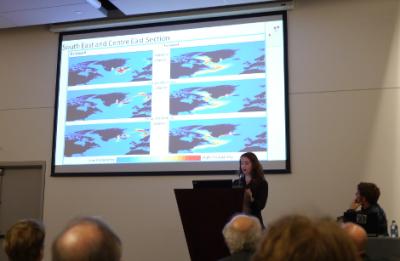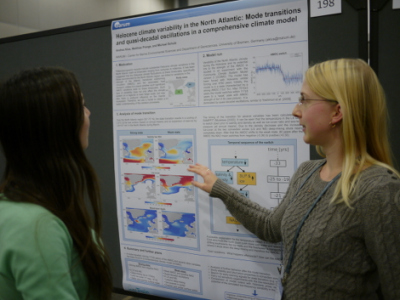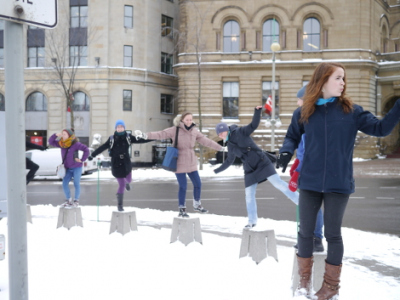Die Inhalte dieser Seite sind leider nicht auf Deutsch verfügbar.
Seitenpfad:
- ArcTrain
- Training reports
- Conference "Arctic Change 2014"
Conference "Arctic Change 2014"
December 8-12, 2014, Ottawa
The international Arctic Change 2014 conference took place from 8 to 12 December 2014 in Ottawa, Canada. It was one of the largest Arctic-focused scientific conferences ever held in Canada with international researchers, indigenous leaders, policy makers, northern community members, and private sector representatives addressing the challenges and opportunities linked to climate change and modernization in the Arctic region. In total, close to 1,200 participants from more than 20 countries contributed to this multidisciplinary conference with more than 350 poster and about 450 oral presentations. This 5-day conference started with the International Arctic Change 2014 Student Day, during which plenary talks and various workshops were offered especially for young researchers and early career scientists.
Among others, we participated in the following different workshops: “Polar Data Catalogue” (Rebecca, Valeriia); “Navigating Northern Research: Inuit Research Advisor's Guide to Research in the Canadian North” (Valeriia); “Writing workshop: Using narrative structure to communicate more effectively” (Mischa); “Professionalism in media: making your research accessible to the public” (Andrea, Kerstin, Mischa, Valeriia) and “Communicating Science” (Andrea, Mischa).

A reoccurring theme in all of those was to cross existing scientific borders, obtaining formerly unknown data from other researchers and local communities and presenting the own results in effective ways as well to the scientific community as to the general public. From Wednesday to Friday a broad variety of plenary and topical sessions was offered covering different topics from social, political and natural sciences. By attending those multidisciplinary sessions we gained a far-reaching insight into other scientific areas dealing with the Arctic.

This and the lively discussions after the presentations allowed us to broaden our scientific horizon and place our own work much better in a wider context. During this conference we took the opportunity to present our first results as posters during the two dedicated poster sessions. Our poster presentations have been titled as follows: “Holocene climate variability in the North Atlantic: Mode transitions and quasi-decadal oscillations in a comprehensive climate model” (Andrea); “Assessing seasonal biases in paleoceanographic reconstructions by modeling the habitat of planktonic foraminifera in the North Atlantic Ocean during the last glacial period” (Kerstin);
“Investigating Arctic sea ice properties with an adjoint model” (Mischa); “The chronology of clastic supply to the central Baffin Bay during the last deglacial ice sheet melting” (Rebecca); “Radiogenic isotope signals of late Pleistocene to Holocene meltwater events from sediment cores of the Baffin Bay” (Valeriia).
We additionally delivered pitch presentations about our work both to entice a bigger audience to our posters and to talk in front of a large audience. During the poster sessions several interesting discussions arose even among the different disciplines present at this conference. By visiting other posters and by joining in the discussions we learned a lot about e.g. the ongoing climate change, the challenges Indigenous people face and the possible strategies dealing with the ongoing transformations of the Arctic. In summary, we broadened our knowledge, we gained even more valuable insights into multi- disciplinary Arctic research and we were able to expand our scientific networks.

We, therefore, would like to thank ArcTrain for the financial support, which allowed us to attend the Arctic Change 2014.
Rebecca Jackson, Valeriia Kirillova, Andrea Klus, Kerstin Kretschmer, Mischa Ungermann
Rebecca Jackson, Valeriia Kirillova, Andrea Klus, Kerstin Kretschmer, Mischa Ungermann


